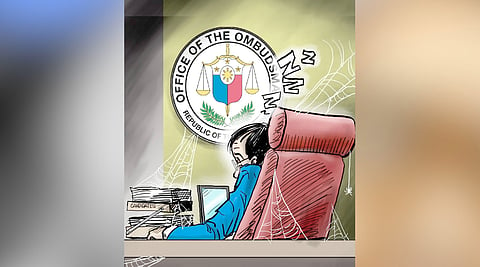
- NEWS
- the EDIT
- COMMENTARY
- BUSINESS
- LIFE
- SHOW
- ACTION
- GLOBAL GOALS
- SNAPS
- DYARYO TIRADA
- MORE

Whispers in the halls of power that Nosy Tarsee was made privy to suggest a growing storm around a key anti-graft post, still vacant as the clock ticks toward a critical deadline.
The Office of the Ombudsman, tasked with upholding justice, is under fire for dragging its feet on what some call “nuisance” complaints against candidates vying for its top seat.
With President Ferdinand Marcos Jr.’s reputation for clean governance hanging in the balance, the delay is raising eyebrows and eroding public trust.
A certain high-profile figure, cleared amid whispers of favoritism, has sparked outrage, with claims of procedural shortcuts fanning the flames of political feuds.
An anonymous memo, allegedly from the agency’s own ranks, cried foul over case prioritization, echoing the adage: “Justice delayed is justice denied.”
The President has yet to appoint a new Ombudsman since Samuel Martires’ term ended in July.
The Judicial and Bar Council (JBC) is expected to post the shortlist of nominees in the next few weeks, as the vacancy in the Office of the Ombudsman must be filled no later than 27 October.
The foot-dragging in the resolution of the complaints against the nominees is in contrast to the swift resolution of the case of GSIS chairperson and general manager Jose “Wick” Veloso, whose suspension was lifted on 19 September, two months after he was accused of misappropriating funds through questionable investments.
Veloso and several GSIS executives were suspended on 11 July, but the Ombudsman ruled that they no longer posed a risk of tampering with the probe, leading to the lifting of their suspensions.
The Ombudsman typically takes six to twelve months to conclude an investigation, with extensions allowed depending on the case.
As the Judicial and Bar Council races to finalize its shortlist by late October, the President faces a pivotal choice — one that could either cement his anti-corruption legacy or cast a long shadow over it.
The controversy will create the perception of selective justice if the Ombudsman acts differently on cases pending before it.
The Ombudsman’s constitutional role is to be the “protector of the people” against graft and corruption.
If a perception of “favoritism” exists within the key institution, it directly contradicts the President’s commitment to clean and impartial governance.
The conflict also exacerbates the internal division within the administration’s political alliance, diverting attention away from national issues and projecting instability.
The question that arises: Will the Ombudsman pick up its pace or will the scales of justice tip under the weight of doubt?
